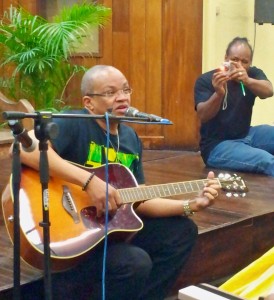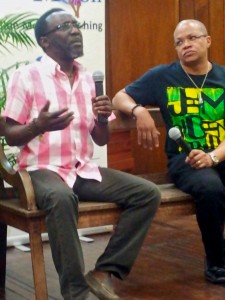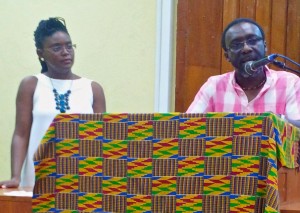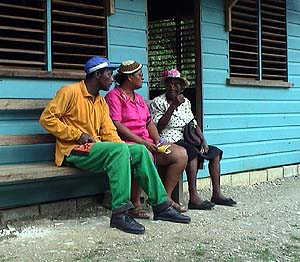
When Is a Joke Serious? A Long Bench Discussion on Comedy and Society
April 14th, 2015
“Tek serious ting mek laugh.”
Making light of a serious matter – turning it into a joke – is a tendency among Jamaicans. We explored the how and the why of this with two terrific Jamaican exponents of the art of laughter, Owen “Blakka” Ellis and Dr. Michael Abrahams, at a Sunday morning session headlined “Fun and Joke Aside.” BluMoon Publishing/Blouse and Skirt Books (publishers of Blakka’s new book of poetry “Riddim and Riddles”) co-hosted the event with the University of the West Indies’ Department of Literatures in English.
Blakka made a startling confession, right off the bat: He is, in fact, a lesbian. Yes, it made perfect sense – he did not feel any affinity for the macho male culture around him growing up, he said, but he definitely liked girls! Dr. Abrahams informed us that laughter is good for you. He cited a study in Israel of women who had just received in-vitro fertilization and were immediately afterwards entertained by a clown. Those women were 2.67 times more likely to conceive than another group of women who did not get the laughter treatment. It’s therapy. But is comedy a form of escapism, BluMoon Publishing’s CEO Tanya Batson-Savage asked – or is it “a space” for us to sit and look at ourselves, our society? Or perhaps, I might add, a survival mechanism?
Blakka grew up in Trench Town. His classmates found him a regular source of amusement. But –“poverty isn’t funny.” When the children laughed at his strange footwear (“hand-me-down shoes from auntie boyfriend”) for Blakka it was not a joke – it was reality. And yet we often give harsh realities a humorous twist, with a turn of phrase and a play on words. It’s a Jamaican thing.
For Mikey Abrahams, social justice issues spur him on. He gets angry about child abuse, sexism, human rights abuses and environmental destruction. He has to speak out. He is strongly opposed to the antiquated law criminalizing buggery remaining on the books. He performed one of his songs “We Didn’t Start the Fire” (it’s on YouTube) about the Riverton dump fire that poisoned us all just a few weeks ago, taking a dig at Government officials’ inept handling of the disaster.
Blakka’s inspiration was his aforementioned auntie, whom he lived with for a while. She had a way, he said, of combining the religious and the profane. She was also a political “tribalist” and her use of words – bad words and otherwise – was extraordinary. His love of words came from her. He read a poignant poem about her funeral.
So why do Jamaicans “tek bad tings mek laugh?” Dr. Abrahams believes many Jamaicans have “a low emotional IQ.” They have feelings, but do not understand them and cannot express them adequately. So they laugh out of discomfort or embarrassment. Blakka agreed: “We are not comfortable with emotion.“ Both gave examples of Jamaicans finding humor in tragic situations; for example, many laughed at a traumatized resident of Tivoli Gardens’ cry (“The people are deading”)on television. This was during one of the greatest human rights abuses in our history. Jamaicans often find someone who is “different” – too short, too tall, big nose – somehow amusing. But that is laughing at someone, not about them.

Dr. Michael Abrahams sings about the Riverton dump fire, while poet and writer Mel Cooke (also published by BluMoon) takes a photo.
So, in a small society where everyone’s words are noted and critiqued, what do comedians do to avoid offending people? Blakka and Michael tend to push the envelope as far as they think it can go without upsetting their audience. Michael Abrahams (he’s a gynecologist by profession, and also a Gleaner columnist) finds religion and homophobia a rich source of material. Both agreed that topics like child abuse, slavery and rape were off limits. Blakka also pointed out the danger of humor of “normalizing” – or neutralizing – an offensive topic if the joke is repeated often enough. As for politics, a minefield in Jamaica, both comedians say they are non-partisan in their commentary. Political party supporters on both sides have labeled them “green” or “orange” from time to time, but this happens to anyone in the public eye.
We talked a little more about the comedian’s mindset. I asked about the frequent link between comedians and depression – thinking of Richard Pryor, Owen Wilson, Robin Williams, a number of other famous names. “Just because you’re funny doesn’t mean you’re happy,” Blakka responded. Both said they had had bouts of depression. Mikey launched into an amazing rap of a song of his called “Uptown Childhood Story” – bitter, violent and darkly funny. His father, he said, had his demons – what we call an anger management problem. Blakka recounted his frustration and stress prior to a show; he was “juggling…angry,” he said, but when he got on stage he did a great show. “What kind of life is this?” he wondered to himself – angry one moment, funny the next?
And how do they deal with stress? Mikey loves music, and his family. Blakka finds a “distraction,” channeling his thoughts elsewhere.
There is nothing easy about comedy, they agreed. I have often thought it’s easier to do tragedy, if one had to choose between those two Greek masks. Stand-up comedy is really hard, said Mikey and Blakka. In Jamaica, “You can’t do the same old stuff,” they pointed out, because everyone would have heard it before. They have to be constantly working on new material; unlike North American counterparts, they can’t simply move on to another city, where their material would be new to that audience. Veteran pop groups like Air Supply (enormously popular in Jamaica for some inexplicable reason!) can visit and sing the same songs over and over – but not the comedian.
And there is another more serious issue, one that applies to all the creative arts in Jamaica: They are not respected as working artists. Jamaicans don’t see comedy as work, at all, in fact. So, like other creatives, they are often neither appreciated nor rewarded. Blakka gave the example of an artist who painted a mural on a house. When he gave them a quote for the cost the owners demurred, considering it too pricey. Yet, when a regular painter painted the house white, they paid him without hesitation.
Well, Jamaicans often say that if we didn’t laugh about things that happen here, we would cry. And as Blakka said, “What would happen to us if we stopped laughing? Something a go buss’…”
Yes, we would all be in trouble – comedians and audience alike. So let’s keep laughing. It’s good for us.
Oh, I forgot to mention the long bench, kindly provided by the Institute of Jamaica, on which the two sat. After a while, it appeared to be under pressure. From the podium, Tanya Batson-Savage murmured warnings as it became unstable. The comedians jumped to their feet. Clearly, Jamaican fun and laughter was too much for the long bench to handle.
Tags: Blouse and Skirt Books, BluMoon Publishing, comedy, family, mental health, Michael Abrahams, Owen Blakka Ellis, poetry, Trench Town, University of the West Indies
The Gleaner reserves the right not to publish comments that may be deemed libelous, derogatory or indecent.
To respond to The Gleaner please use the feedback form.
3 Responses to “When Is a Joke Serious? A Long Bench Discussion on Comedy and Society”
- We Are the Zoomers
- Living Online with Humans and Birds: NAOC 2020
- Human Trafficking and the Problem of Public Education
- Down Memory Lane
- Are We Ready to Recover from COVID-19?
- Road Safety Matters: Is Your Vehicle Safe?
- Sexual Harassment, Me Too, and the Minister’s Disturbing Giggle
- The Vulnerable Senior Citizens, Private Care Homes and COVID-19
- A Muddle Over Masks
- Here is Something Life-Saving You Can Do: Give Blood!







[…] BluMoon Publishing, founded by the intrepid Tanya Batson-Savage, for their exploration of the many and varied nuances of Jamaican writing – and for the creative and lively ways in which their present their growing list of books to the public. Last Sunday morning’s “Fun and Joke Aside” was a good example. I wrote about it in my blog for the Gleaner online here: http://gleanerblogs.com/socialimpact/?p=2617 […]
The road to hell is paved with jokes of not so good intentions
Weltbuerger
Well, this might be true! But all these jokes were well-intentioned, I believe!